Ward A.W. The Cambridge History of British Foreign Policy. 1783-1919. Volume 3
Подождите немного. Документ загружается.

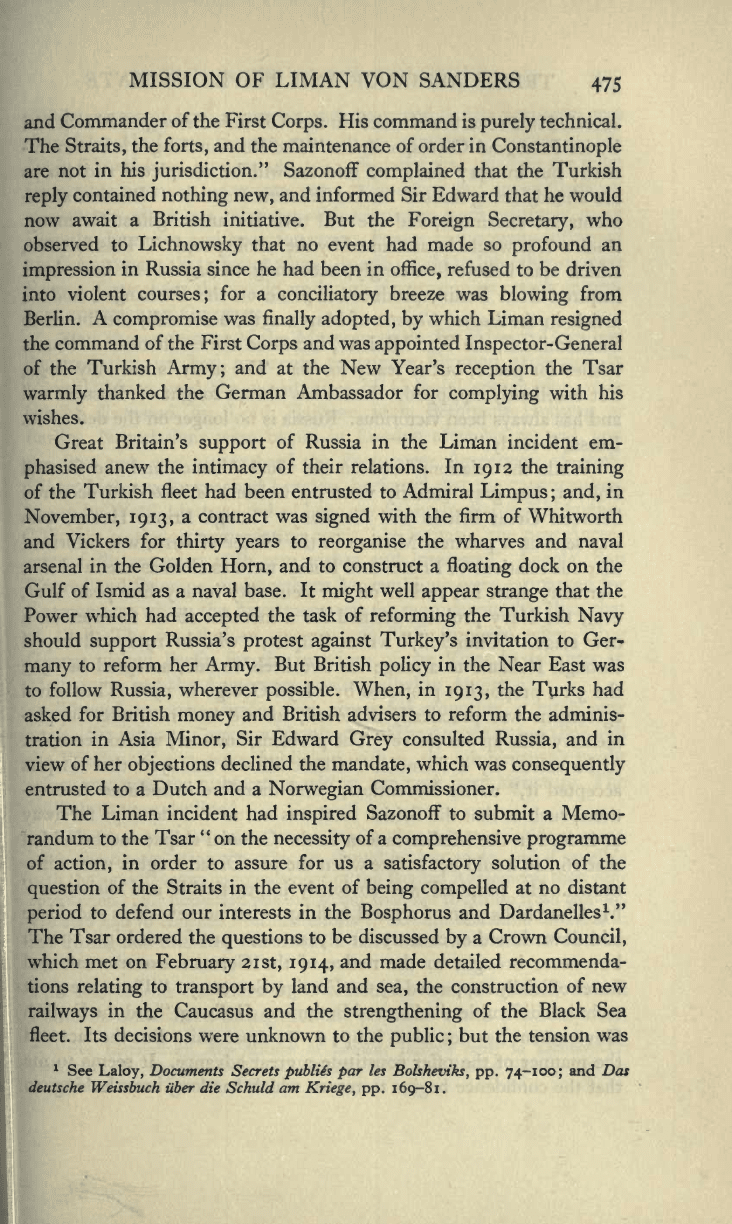
MISSION OF LIMAN
VON SANDERS
475
and
Commander
of
the
First
Corps.
His command
is
purely
technical.
The
Straits,
the
forts,
and
the
maintenance
of
order
in
Constantinople
are
not
in his
jurisdiction."
Sazonoff
complained
that the
Turkish
reply
contained
nothing
new,
and
informed
Sir Edward
that
he
would
now await
a
British
initiative. But the
Foreign Secretary,
who
observed
to
Lichnowsky
that
no
event
had made
so
profound
an
impression
in
Russia since he
had
been
in
office,
refused
to
be driven
into
violent
courses;
for
a
conciliatory
breeze was
blowing
from
Berlin.
A
compromise
was
finally
adopted,
by
which Liman
resigned
the
command
of
the First
Corps
and was
appointed Inspector-General
of
the
Turkish
Army;
and
at the
New
Year's
reception
the
Tsar
warmly
thanked the
German Ambassador for
complying
with
his
wishes.
Great
Britain's
support
of
Russia
in
the Liman incident em-
phasised
anew
the
intimacy
of
their
relations.
In
19
12 the
training
of
the
Turkish
fleet
had been entrusted to Admiral
Limpus;
and,
in
November,
19 13,
a contract
was
signed
with
the firm
of
Whitworth
and
Vickers
for
thirty
years
to
reorganise
the
wharves
and
naval
arsenal
in
the
Golden
Horn,
and to
construct
a
floating
dock
on
the
Gulf of
Ismid
as a naval base. It
might
well
appear
strange
that
the
Power
which had
accepted
the
task
of
reforming
the
Turkish
Navy
should
support
Russia's
protest against Turkey's
invitation to
Ger-
many
to
reform
her
Army.
But British
policy
in
the Near
East
was
to
follow
Russia,
wherever
possible.
When,
in
19 13,
the
Turks
had
asked
for British
money
and
British
advisers to
reform
the adminis-
tration
in Asia
Minor,
Sir
Edward
Grey
consulted
Russia,
and
in
view
of
her
objections
declined the
mandate,
which was
consequently
Intrusted
to a Dutch and
a
Norwegian
Commissioner.
The Liman incident
had
inspired
Sazonoff
to
submit a
Memo-
andum to the
Tsar
"
on the
necessity
of a
comprehensive
programme
f
action,
in
order
to
assure
for us a
satisfactory
solution
of
the
question
of
the
Straits
in
the event
of
being compelled
at
no distant
period
to
defend our
interests
in the
Bosphorus
and
Dardanelles
1
."
The
Tsar ordered
the
questions
to
be discussed
by
a
Crown
Council,
which
met
on
February
21st,
19
14,
and made
detailed
recommenda-
tions
relating
to
transport by
land
and
sea,
the construction
of new
railways
in
the
Caucasus
and the
strengthening
of
the
Black Sea
fleet. Its decisions
were
unknown to the
public
;
but
the tension
was
1
See
Laloy,
Documents
Secrets
publics
par
les
Bolsheviks,
pp.
74-100;
and
Das
deutsche
Weissbuch iiber
die Schuld
am
Kriege,
pp.
169-81.
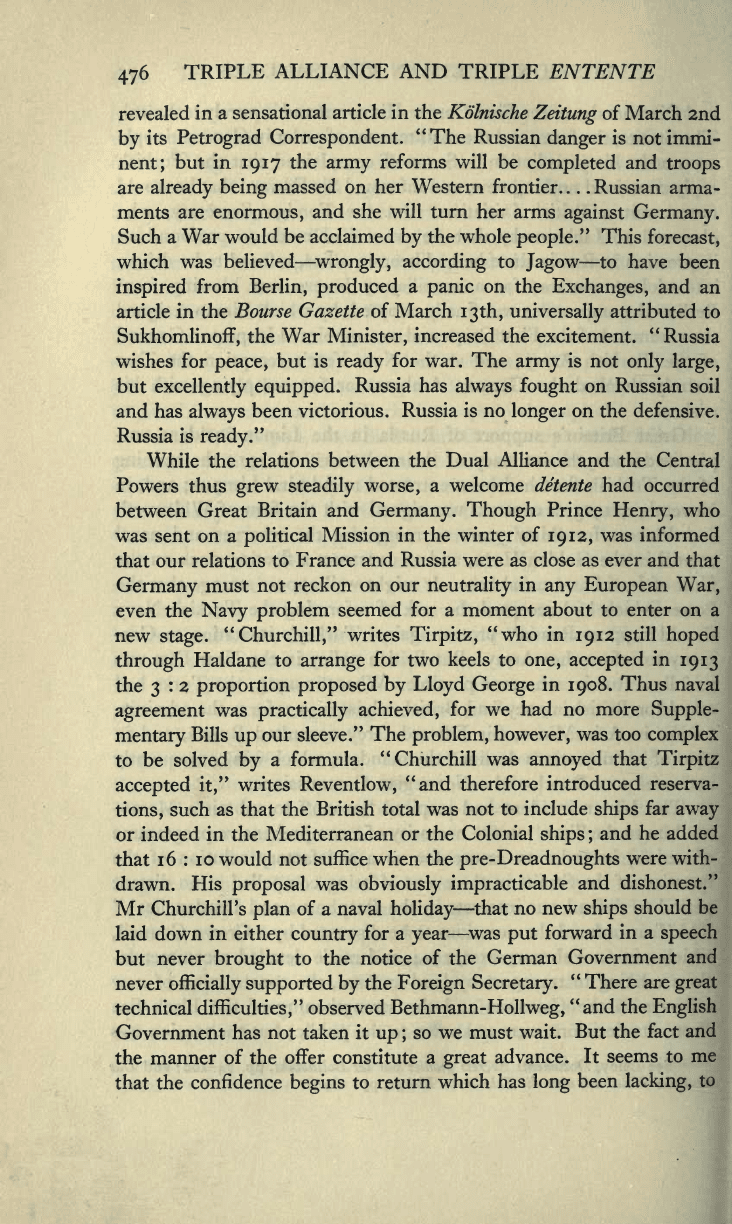
476
TRIPLE
ALLIANCE
AND
TRIPLE
ENTENTE
revealed
in a sensational
article
in
the Kolnische
Zeitung
of March
2nd
by
its
Petrograd
Correspondent.
"The
Russian
danger
is
not
immi-
nent;
but
in
1917
the
army
reforms will be
completed
and
troops
are
already being
massed
on
her Western
frontier
Russian
arma-
ments
are
enormous,
and
she will turn her
arms
against
Germany.
Such
a
War
would
be acclaimed
by
the
whole
people."
This
forecast,
which
was
believed
—
wrongly, according
to
Jagow
—
to have
been
inspired
from
Berlin,
produced
a
panic
on the
Exchanges,
and
an
article
in
the
Bourse
Gazette of March
13th,
universally
attributed
to
Sukhomlinoff,
the
War
Minister,
increased
the excitement.
"
Russia
wishes for
peace,
but
is
ready
for war. The
army
is
not
only
large,
but
excellently
equipped.
Russia has
always fought
on
Russian
soil
and has
always
been
victorious.
Russia is no
longer
on
the defensive.
Russia is
ready."
While the
relations
between the
Dual Alliance and
the
Central
Powers
thus
grew
steadily
worse,
a welcome detente
had
occurred
between
Great
Britain
and
Germany. Though
Prince
Henry,
who
was
sent
on a
political
Mission in
the
winter
of
191
2,
was informed
that
our relations
to
France and Russia
were
as
close as
ever and
that
Germany
must
not
reckon
on our
neutrality
in
any
European
War,
even the
Navy
problem
seemed
for
a moment about to
enter on
a
new
stage.
"Churchill,"
writes
Tirpitz,
"who in
1912
still
hoped
through
Haldane to
arrange
for
two
keels
to
one,
accepted
in
191 3
the
3
:
2
proportion
proposed by
Lloyd
George
in
1908.
Thus naval
agreement
was
practically
achieved,
for we had no more
Supple-
mentary
Bills
up
our
sleeve."
The
problem,
however,
was
too
complex
to
be
solved
by
a
formula.
"Churchill was
annoyed
that
Tirpitz
accepted
it,"
writes
Reventlow,
"and therefore introduced
reserva-
tions,
such
as
that
the British total
was
not to
include
ships
far
away
or indeed
in
the Mediterranean
or the
Colonial
ships
;
and
he added
that
16
: 10
would
not
suffice
when the
pre-Dreadnoughts
were with-
drawn.
His
proposal
was
obviously
impracticable
and
dishonest."
Mr Churchill's
plan
of a naval
holiday
—
that
no
new
ships
should
be
laid down
in
either
country
for
a
year
—
was
put
forward
in a
speech
but
never
brought
to the notice
of
the
German
Government
and
never
officially
supported
by
the
Foreign
Secretary.
"
There
are
great
technical
difficulties,"
observed
Bethmann-Hollweg,
"and the
English
Government
has not taken it
up
;
so
we must wait.
But
the
fact
and
the
manner
of the offer constitute
a
great
advance.
It
seems to
me
that the
confidence
begins
to
return
which has
long
been
lacking,
to
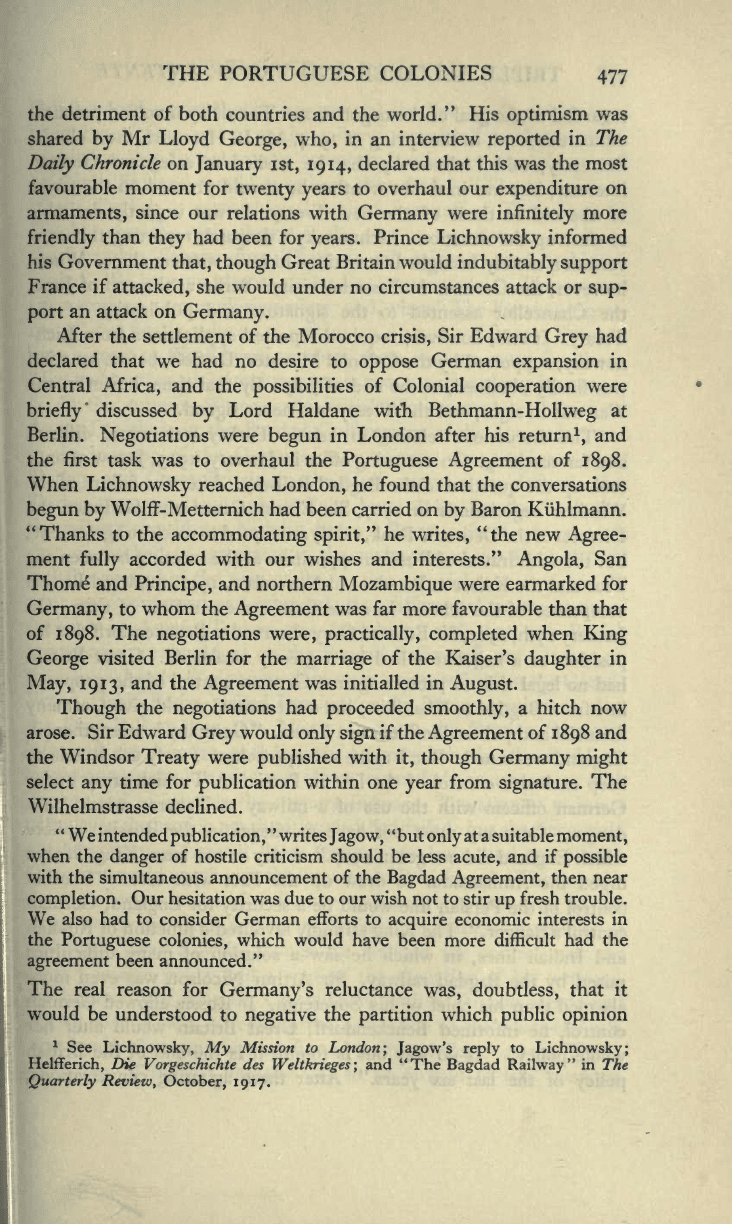
THE
PORTUGUESE
COLONIES
477
the detriment
of
both
countries
and
the
world." His
optimism
was
shared
by
Mr
Lloyd
George,
who,
in
an
interview
reported
in
The
Daily
Chronicle on
January
1st,
19
14,
declared that
this was
the most
favourable
moment for
twenty years
to overhaul
our
expenditure
on
armaments,
since our
relations with
Germany
were
infinitely
more
friendly
than
they
had been
for
years.
Prince
Lichnowsky
informed
his
Government
that,
though
Great Britain
would
indubitably
support
France
if
attacked,
she would
under
no
circumstances attack
or
sup-
port
an
attack
on
Germany.
After
the
settlement
of
the
Morocco
crisis,
Sir Edward
Grey
had
declared
that
we
had no
desire
to
oppose
German
expansion
in
Central
Africa,
and
the
possibilities
of Colonial
cooperation
were
briefly'
discussed
by
Lord Haldane
with
Bethmann-Hollweg
at
Berlin.
Negotiations
were
begun
in London
after his
return
1
,
and
the first task
was
to
overhaul
the
Portuguese Agreement
of
1898.
When
Lichnowsky
reached
London,
he found
that the
conversations
begun by
Wolff-
Metternich
had been
carried
on
by
Baron Kiihlmann.
"Thanks
to
the
accommodating
spirit,"
he
writes,
"the
new
Agree-
ment
fully
accorded
with
our wishes
and
interests."
Angola,
San
Thome
and
Principe,
and
northern
Mozambique
were earmarked
for
Germany,
to
whom
the
Agreement
was far more favourable
than that
of
1898.
The
negotiations
were,
practically,
completed
when
King
George
visited
Berlin
for
the
marriage
of the Kaiser's
daughter
in
May, 1913,
and
the
Agreement
was
initialled
in
August.
Though
the
negotiations
had
proceeded
smoothly,
a
hitch
now
arose. Sir Edward
Grey
would
only sign
if
the
Agreement
of
1898
and
the
Windsor
Treaty
were
published
with
it,
though Germany
might
select
any
time
for
publication
within one
year
from
signature.
The
Kftlhelmstrasse
declined.
1 '
We
intended
publication
,
'
'
writes
Jagow,
' '
but
only
at a suitable
moment
,
hen
the
danger
of
hostile
criticism should be
less
acute,
and if
possible
ith
the
simultaneous announcement
of
the
Bagdad Agreement,
then near
)mpletion.
Our hesitation was due to our wish
not to stir
up
fresh
trouble.
We also had to
consider German efforts
to
acquire
economic
interests
in
the
Portuguese
colonies,
which would have
been more difficult
had the
agreement
been
announced."
The
real
reason
for
Germany's
reluctance
was,
doubtless,
that it
would
be understood
to
negative
the
partition
which
public
opinion
1
See
Lichnowsky,
My
Mission
to
London-,
Jagow's
reply
to
Lichnowsky;
Helfferich,
Die
Vorgeschichte
des
Weltkrieges
;
and "The
Bagdad
Railway"
in
The
Quarterly
Review,
October,
191
7.
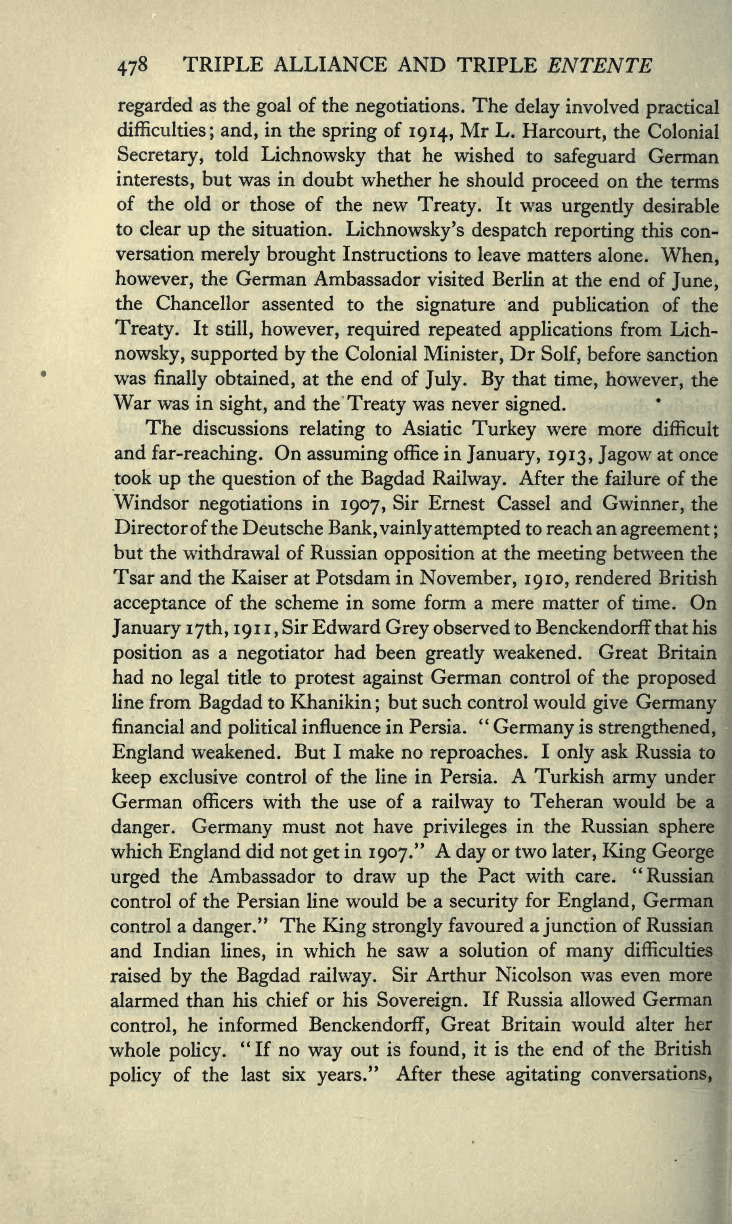
478
TRIPLE
ALLIANCE
AND
TRIPLE
ENTENTE
regarded
as the
goal
of the
negotiations.
The
delay
involved
practical
difficulties; and,
in
the
spring
of
1914,
Mr
L.
Harcourt,
the
Colonial
Secretary,
told
Lichnowsky
that
he
wished
to
safeguard
German
interests,
but
was in
doubt whether he should
proceed
on
the terms
of
the old
or
those
of
the new
Treaty.
It
was
urgently
desirable
to clear
up
the
situation.
Lichnowsky
's
despatch
reporting
this
con-
versation
merely brought
Instructions to
leave
matters
alone.
When,
however,
the
German
Ambassador
visited Berlin
at the end
of
June,
the Chancellor
assented to
the
signature
and
publication
of
the
Treaty.
It
still,
however,
required repeated applications
from
Lich-
nowsky, supported
by
the Colonial
Minister,
Dr
Solf,
before
sanction
was
finally
obtained,
at the
end of
July.
By
that
time,
however,
the
War
was in
sight,
and
the
Treaty
was
never
signed.
The discussions
relating
to
Asiatic
Turkey
were
more
difficult
and
far-reaching.
On
assuming
office in
January, 1913, Jagow
at once
took
up
the
question
of
the
Bagdad Railway.
After the failure of
the
Windsor
negotiations
in
1907,
Sir
Ernest
Cassel and
Gwinner,
the
Director
of
the Deutsche
Bank,
vainly attempted
to reach
an
agreement
;
but the
withdrawal
of Russian
opposition
at the
meeting
between
the
Tsar
and
the Kaiser at
Potsdam
in
November,
19
10,
rendered
British
acceptance
of
the
scheme in some
form a
mere
matter
of
time. On
January 17th,
191
1,
Sir Edward
Grey
observed to Benckendorff
that
his
position
as
a
negotiator
had
been
greatly
weakened. Great
Britain
had
no
legal
title to
protest
against
German
control
of
the
proposed
line from
Bagdad
to
Khanikin
;
but
such
control
would
give Germany
financial
and
political
influence
in
Persia.
"
Germany
is
strengthened,
England
weakened. But
I
make
no
reproaches.
I
only
ask
Russia
to
keep
exclusive
control
of
the
line
in Persia.
A Turkish
army
under
German
officers with the
use
of
a
railway
to
Teheran would
be
a
danger. Germany
must
not
have
privileges
in
the
Russian
sphere
which
England
did
not
get
in
1907."
A
day
or
two
later,
King George
urged
the
Ambassador to draw
up
the
Pact with care.
"Russian
control
of
the Persian
line would be
a
security
for
England,
German
control
a
danger."
The
King strongly
favoured a
junction
of Russian
and Indian
lines,
in
which
he
saw a solution
of
many
difficulties
raised
by
the
Bagdad railway.
Sir
Arthur
Nicolson was even more
alarmed than
his chief or his
Sovereign.
If
Russia allowed
German
control,
he
informed
Benckendorff,
Great
Britain would alter
her
whole
policy.
"
If no
way
out
is
found,
it
is
the
end
of
the
British
policy
of the
last
six
years."
After these
agitating
conversations,
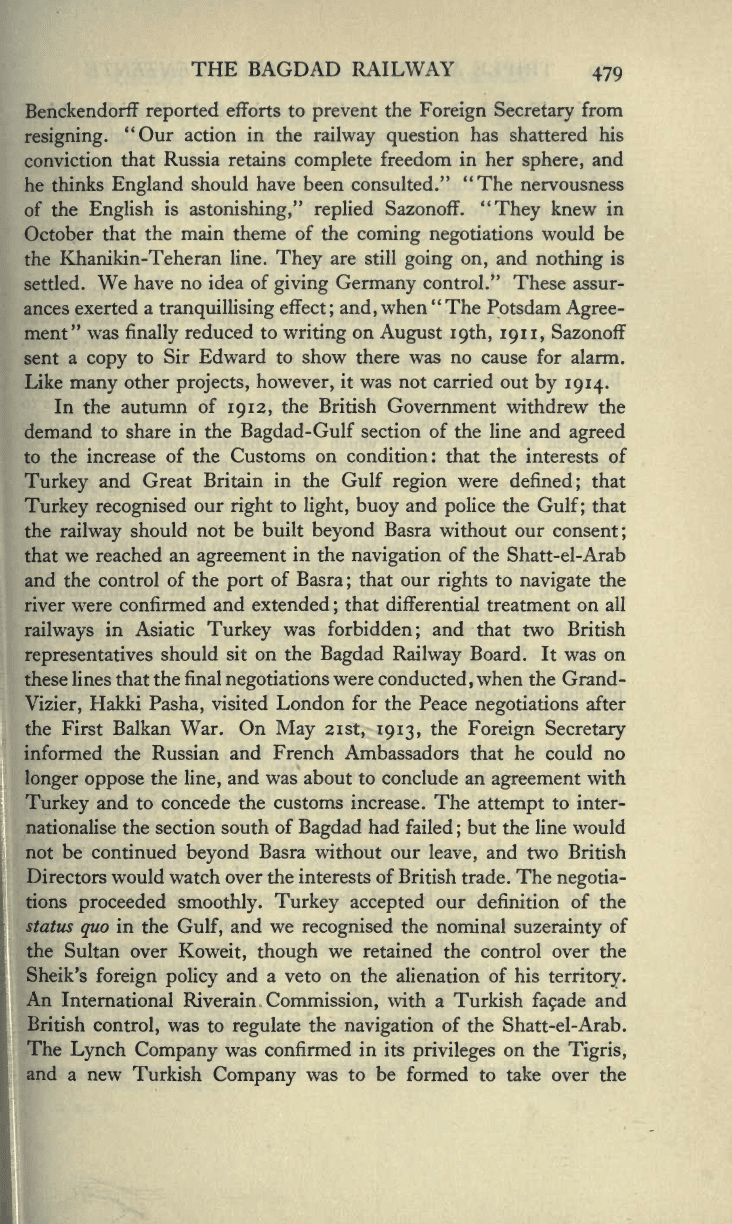
THE BAGDAD RAILWAY
479
BenckendorfF
reported
efforts to
prevent
the
Foreign Secretary
from
resigning.
"Our
action
in
the
railway question
has
shattered
his
conviction
that
Russia
retains
complete
freedom
in
her
sphere,
and
he thinks
England
should have been
consulted."
"The
nervousness
of the
English
is
astonishing," replied
Sazonoff.
"They
knew
in
October
that
the
main
theme
of
the
coming negotiations
would
be
the
Khanikin-Teheran
line.
They
are still
going
on,
and
nothing
is
settled.
We have no idea
of
giving Germany
control."
These assur-
ances
exerted
a
tranquillising
effect;
and,
when
"
The
Potsdam
Agree-
ment"
was
finally
reduced
to
writing
on
August 19th,
191
1,
Sazonoff
sent
a
copy
to
Sir Edward to show
there
was no
cause for
alarm.
Like
many
other
projects,
however,
it
was
not
carried
out
by 19
14.
In
the
autumn
of
1912,
the British Government
withdrew the
demand to
share
in
the
Bagdad
-Gulf
section of
the line and
agreed
to the
increase
of
the
Customs
on
condition:
that
the
interests
of
Turkey
and Great Britain
in
the
Gulf
region
were
defined;
that
Turkey
recognised
our
right
to
light, buoy
and
police
the
Gulf;
that
the
railway
should not
be built
beyond
Basra
without our
consent;
that
we reached
an
agreement
in
the
navigation
of
the Shatt-el-Arab
and
the
control
of the
port
of Basra
;
that
our
rights
to
navigate
the
river were confirmed
and extended
;
that differential
treatment
on
all
railways
in
Asiatic
Turkey
was
forbidden;
and
that two British
representatives
should sit
on
the
Bagdad Railway
Board.
It
was on
these lines that the
final
negotiations
were
conducted
,
when the Grand-
Vizier,
Hakki
Pasha,
visited
London for
the Peace
negotiations
after
the
First
Balkan War.
On
May
21st,
191 3,
the
Foreign Secretary
informed the
Russian and
French
Ambassadors
that he could
no
longer oppose
the
line,
and
was
about to conclude an
agreement
with
Kurkey
and
to
concede the
customs
increase. The
attempt
to inter-
itionalise
the section
south
of
Bagdad
had
failed
;
but the line
would
)t be continued
beyond
Basra
without
our
leave,
and
two British
Directors
would
watch
over
the interests
of
British trade. The
negotia-
tions
proceeded
smoothly.
Turkey accepted
our
definition
of
the
status
quo
in
the
Gulf,
and
we
recognised
the
nominal
suzerainty
of
the
Sultan
over
Koweit,
though
we
retained
the control
over
the
Sheik's
foreign policy
and a
veto
on
the
alienation
of
his
territory.
An
International
Riverain
Commission,
with a
Turkish
facade
and
British
control,
was
to
regulate
the
navigation
of
the
Shatt-el-Arab.
The
Lynch
Company
was confirmed
in
its
privileges
on
the
Tigris,
and
a
new
Turkish
Company
was to be
formed to take
over
the
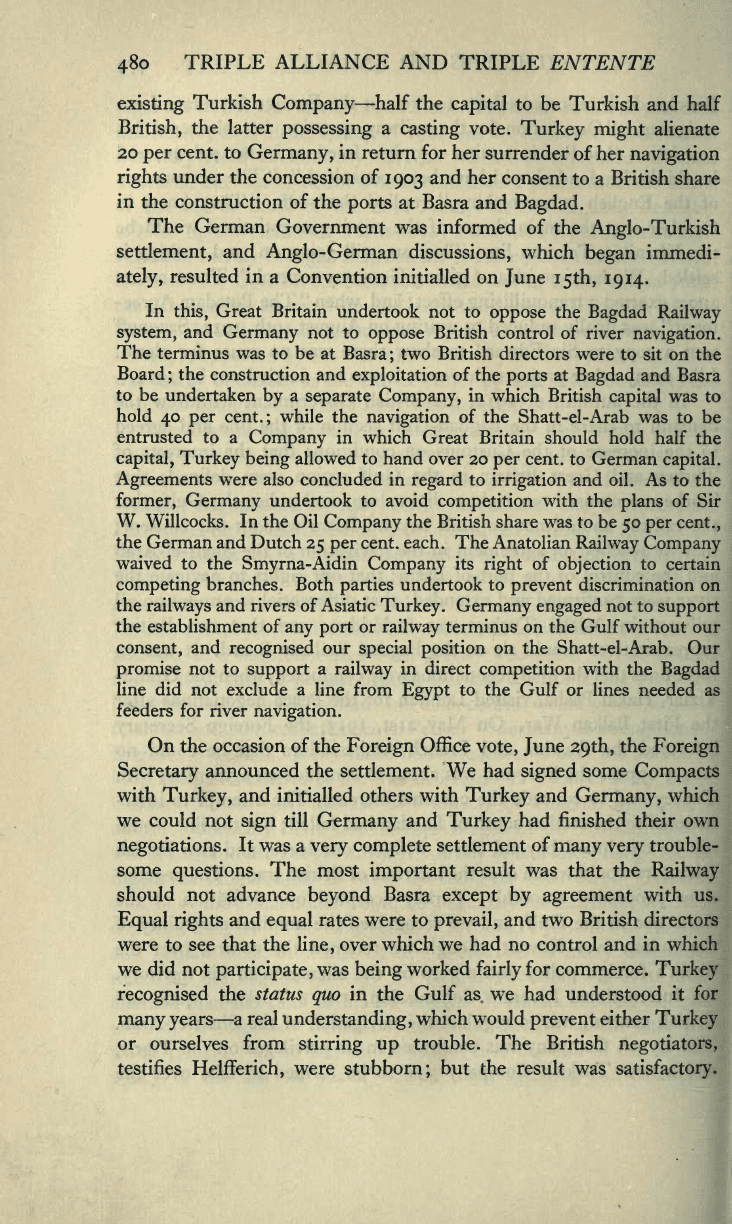
480
TRIPLE
ALLIANCE
AND
TRIPLE ENTENTE
existing
Turkish
Company
—
half the
capital
to be Turkish
and half
British,
the latter
possessing
a
casting
vote.
Turkey
might
alienate
20
per
cent, to
Germany,
in
return
for
her
surrender of her
navigation
rights
under the
concession
of
1903
and her
consent to
a British share
in
the
construction of
the
ports
at Basra and
Bagdad.
The German
Government
was
informed of
the
Anglo-Turkish
settlement,
and
Anglo-German
discussions,
which
began
immedi-
ately,
resulted
in
a
Convention initialled on
June
15th,
19 14.
In
this,
Great
Britain
undertook not
to
oppose
the
Bagdad Railway
system,
and
Germany
not to
oppose
British
control of
river
navigation.
The terminus was
to be at Basra
;
two British
directors
were
to sit on
the
Board
;
the
construction and
exploitation
of the
ports
at
Bagdad
and
Basra
to
be
undertaken
by
a
separate
Company,
in
which British
capital
was to
hold
40 per
cent.;
while the
navigation
of the
Shatt-el-Arab was to be
entrusted to a
Company
in which
Great Britain should hold
half
the
capital,
Turkey
being
allowed to hand
over
20
per
cent,
to
German
capital.
Agreements
were also concluded in
regard
to
irrigation
and
oil.
As to the
former,
Germany
undertook to
avoid
competition
with the
plans
of
Sir
W. Willcocks.
In
the Oil
Company
the
British
share was to be
50
per
cent.,
the German and
Dutch
25 per
cent. each. The Anatolian
Railway Company
waived
to
the
Smyrna-Aidin Company
its
right
of
objection
to
certain
competing
branches.
Both
parties
undertook
to
prevent
discrimination on
the
railways
and
rivers
of
Asiatic
Turkey.
Germany
engaged
not to
support
the
establishment of
any port
or
railway
terminus on
the Gulf without our
consent,
and
recognised
our
special position
on the
Shatt-el-Arab. Our
promise
not to
support
a
railway
in
direct
competition
with
the
Bagdad
line
did
not exclude
a
line
from
Egypt
to
the
Gulf or
lines needed as
feeders for river
navigation.
On
the
occasion of
the
Foreign
Office
vote,
June
29th,
the
Foreign
Secretary
announced the settlement.
We
had
signed
some
Compacts
with
Turkey,
and initialled others with
Turkey
and
Germany,
which
we
could
not
sign
till
Germany
and
Turkey
had finished
their
own
negotiations.
It
was
a
very
complete
settlement
of
many very
trouble-
some
questions.
The most
important
result was
that
the
Railway
should not advance
beyond
Basra
except
by agreement
with
us.
Equal rights
and
equal
rates
were
to
prevail,
and
two
British directors
were
to
see
that
the
line,
over
which we had no
control
and
in which
we
did
not
participate,
was
being
worked
fairly
for
commerce.
Turkey
recognised
the
status
quo
in
the
Gulf
as.
we had understood it
for
many years
—
a real
understanding,
which would
prevent
either
Turkey
or
ourselves
from
stirring
up
trouble.
The
British
negotiators,
testifies
Helfferich,
were
stubborn;
but the
result
was
satisfactory.
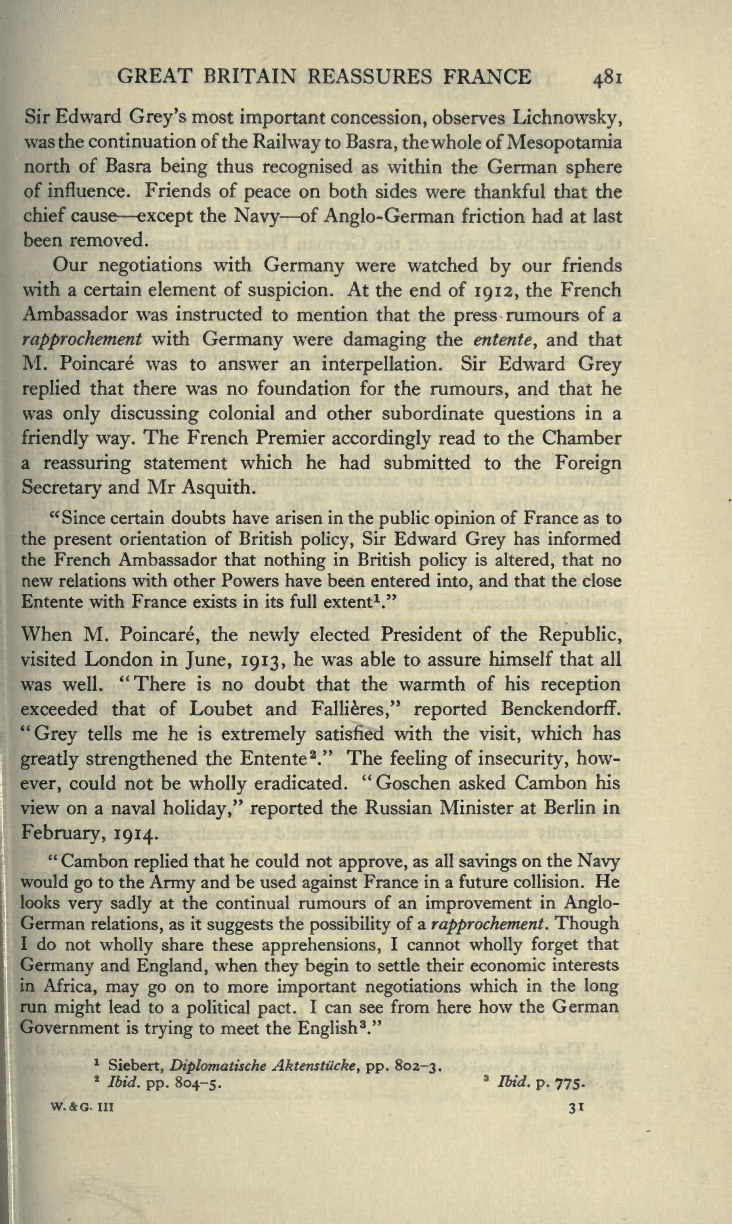
GREAT BRITAIN
REASSURES
FRANCE
481
Sir Edward
Grey's
most
important
concession,
observes
Lichnowsky,
was
the
continuation
of
the
Railway
to
Basra,
the
whole
of
Mesopotamia
north
of
Basra
being
thus
recognised
as
within
the
German
sphere
of
influence.
Friends of
peace
on
both
sides
were
thankful that
the
chief cause
—
except
the
Navy
—
of
Anglo-
German
friction
had
at
last
been
removed.
Our
negotiations
with
Germany
were
watched
by
our friends
with a certain
element
of
suspicion.
At the end of
19
12,
the
French
Ambassador
was instructed
to mention
that the
press
rumours of
a
rapprochement
with
Germany
were
damaging
the
entente,
and that
M.
Poincare
was
to answer
an
interpellation.
Sir
Edward
Grey
replied
that there was
no
foundation
for
the
rumours,
and that
he
was
only discussing
colonial and
other subordinate
questions
in
a
friendly
way.
The French Premier
accordingly
read
to the
Chamber
a
reassuring
statement
which
he
had
submitted to
the
Foreign
Secretary
and
Mr
Asquith.
"Since certain doubts have arisen
in
the
public
opinion
of France as to
the
present
orientation of British
policy,
Sir
Edward
Grey
has informed
the French Ambassador that
nothing
in British
policy
is
altered,
that
no
new relations
with
other Powers have been
entered
into,
and that the close
Entente
with
France exists
in
its
full
extent
1
."
When M.
Poincare,
the
newly
elected President
of
the
Republic,
visited London
in
June,
19 13,
he was able to assure himself that all
was well. "There
is
no
doubt that
the warmth
of his
reception
exceeded
that
of
Loubet
and
Fallieres,"
reported
BenckendorfF.
"Grey
tells
me he is
extremely
satisfied
with
the
visit,
which has
greatly strengthened
the Entente
2
." The
feeling
of
insecurity,
how-
ever,
could
not
be
wholly
eradicated.
"
Goschen
asked Cambon
his
view on
a naval
holiday,"
reported
the
Russian Minister at
Berlin
in
Rbruary,
1914.
"
Cambon
replied
that he could
not
approve,
as all
savings
on the
Navy
uld
go
to
the
Army
and
be
used
against
France
in a future collision.
He
ks
very
sadly
at the continual rumours
of an
improvement
in
Anglo-
uerman
relations,
as it
suggests
the
possibility
of
a
rapprochement.
Though
I
do
not
wholly
share these
apprehensions,
I
cannot
wholly forget
that
Germany
and
England,
when
they
begin
to settle their economic
interests
in
Africa,
may
go
on
to more
important negotiations
which
in the
long
run
might
lead to a
political pact.
I can see from
here
how
the
German
Government is
trying
to
meet
the
English
3
."
1
Siebert,
Diplomatische
Aktenstucke
,
pp. 802-3.
*
Ibid.
pp.
804-5.
3
Ibid.
p. 775.
w.&c
in
31
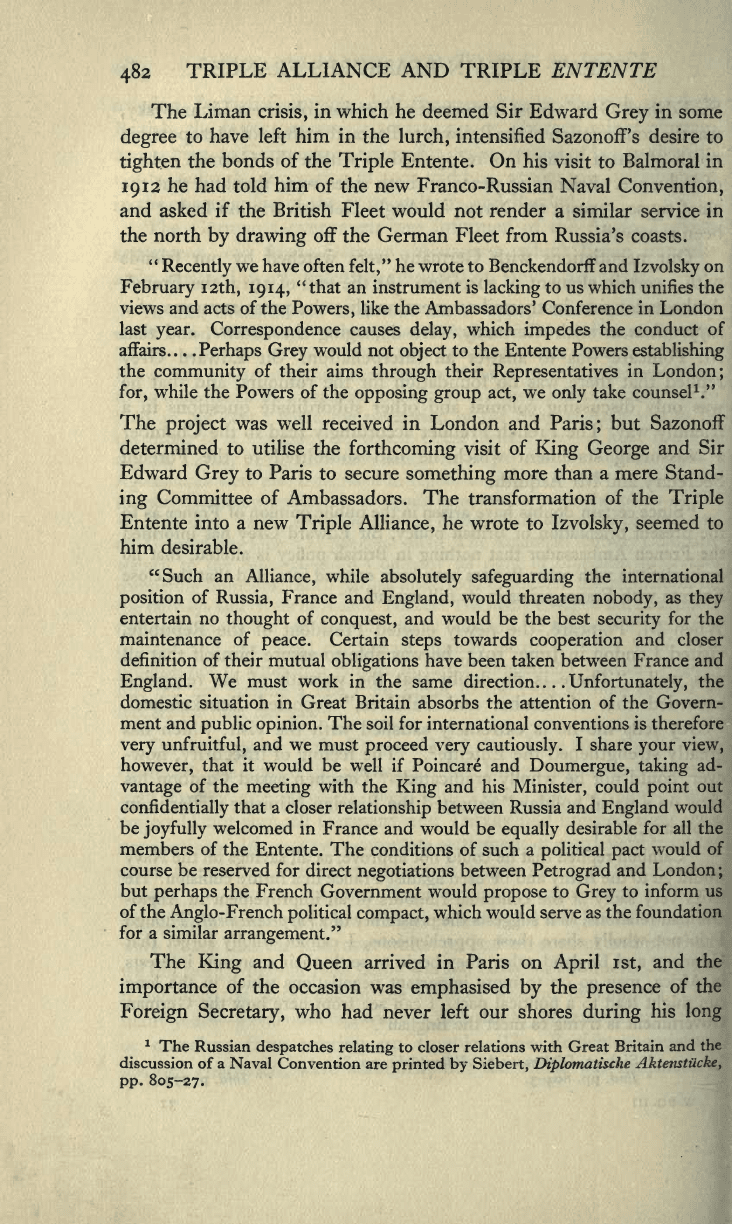
482
TRIPLE
ALLIANCE AND
TRIPLE ENTENTE
The
Liman
crisis,
in which he
deemed
Sir
Edward
Grey
in some
degree
to
have
left
him in
the
lurch,
intensified
SazonofT's
desire
to
tighten
the
bonds of
the
Triple
Entente.
On his
visit to
Balmoral
in
19
1
2 he
had
told
him
of
the new Franco-Russian
Naval
Convention,
and
asked
if
the
British
Fleet
would
not
render
a similar service
in
the north
by drawing
off
the
German
Fleet
from
Russia's
coasts.
"
Recently
we have often
felt,"
he wrote to
Benckendorff and
Izvolsky
on
February
12th,
1914,
"that an
instrument
is
lacking
to us
which unifies
the
views
and
acts of
the
Powers,
like the Ambassadors'
Conference
in London
last
year. Correspondence
causes
delay,
which
impedes
the conduct
of
affairs
Perhaps
Grey
would not
object
to
the Entente
Powers
establishing
the
community
of
their
aims
through
their
Representatives
in
London;
for,
while
the Powers
of the
opposing group
act,
we
only
take counsel
1
."
The
project
was well
received
in
London and
Paris;
but Sazonoff
determined
to
utilise
the
forthcoming
visit
of
King George
and
Sir
Edward
Grey
to Paris
to
secure
something
more
than
a
mere Stand-
ing
Committee
of
Ambassadors.
The
transformation
of
the
Triple
Entente into
a
new
Triple
Alliance,
he
wrote to
Izvolsky,
seemed to
him desirable.
"Such an
Alliance,
while
absolutely
safeguarding
the
international
position
of
Russia,
France and
England,
would threaten
nobody,
as
they
entertain no
thought
of
conquest,
and would
be
the best
security
for
the
maintenance of
peace.
Certain
steps
towards
cooperation
and closer
definition of
their mutual
obligations
have been
taken between France
and
England.
We must
work
in the same direction.
...
Unfortunately,
the
domestic
situation in
Great Britain
absorbs
the attention of the Govern-
ment and
public opinion.
The soil for
international
conventions is
therefore
very
unfruitful,
and
we must
proceed very cautiously.
I share
your
view,
however,
that it
would be
well
if
Poincare
and
Doumergue,
taking
ad-
vantage
of
the
meeting
with
the
King
and
his
Minister,
could
point
out
confidentially
that a
closer
relationship
between Russia
and
England
would
be
joyfully
welcomed in
France and would be
equally
desirable
for all the
members of
the
Entente.
The
conditions of such
a
political
pact
would
of
course be
reserved for direct
negotiations
between
Petrograd
and London
;
but
perhaps
the
French
Government
would
propose
to
Grey
to
inform
us
of the
Anglo-French
political
compact,
which would serve
as the
foundation
for a similar
arrangement."
The
King
and
Queen
arrived
in Paris on
April
1st,
and
the
importance
of
the occasion
was
emphasised by
the
presence
of the
Foreign Secretary,
who had
never left
our shores
during
his
long
1
The
Russian
despatches
relating
to closer
relations with Great
Britain
and
the
discussion of
a
Naval
Convention
are
printed
by
Siebert,
Diplomatische
Aktenstiicke,
pp. 805-27.
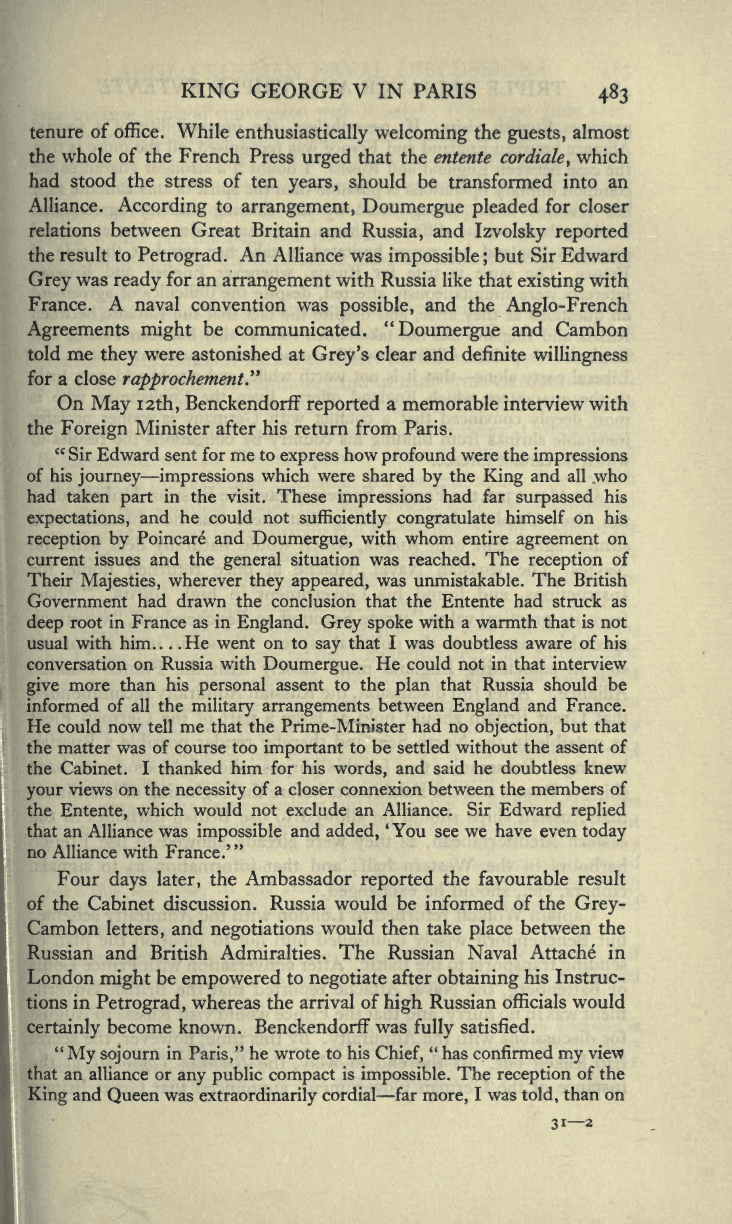
KING
GEORGE V IN
PARIS
483
tenure
of
office. While
enthusiastically
welcoming
the
guests,
almost
the
whole of
the French
Press
urged
that
the
entente
cordiale,
which
had
stood the
stress of
ten
years,
should be
transformed into
an
Alliance.
According
to
arrangement,
Doumergue
pleaded
for closer
relations between
Great Britain
and
Russia,
and
Izvolsky
reported
the
result to
Petrograd.
An
Alliance
was
impossible
;
but
Sir
Edward
Grey
was
ready
for
an
arrangement
with
Russia
like
that
existing
with
France.
A naval
convention was
possible,
and
the
Anglo-French
Agreements
might
be
communicated.
"Doumergue
and Cambon
told
me
they
were
astonished at
Grey's
clear and
definite
willingness
for a
close
rapprochement."
On
May
12th,
BenckendorfF
reported
a
memorable
interview with
the
Foreign
Minister after
his
return
from Paris.
cc
Sir
Edward sent
for
me
to
express
how
profound
were the
impressions
of
his
journey
—
impressions
which
were shared
by
the
King
and all
who
had taken
part
in
the
visit. These
impressions
had
far
surpassed
his
expectations,
and he could not
sufficiently congratulate
himself
on his
reception
by
Poincare
and
Doumergue,
with whom
entire
agreement
on
current issues and the
general
situation was
reached.
The
reception
of
Their
Majesties,
wherever
they appeared,
was unmistakable.
The British
Government
had drawn the conclusion that the
Entente
had struck
as
deep
root
in
France
as in
England. Grey spoke
with
a
warmth
that is not
usual with
him
He
went on to
say
that I was doubtless aware
of
his
conversation on Russia
with
Doumergue.
He
could
not
in
that
interview
give
more
than his
personal
assent to the
plan
that Russia should be
informed of all the
military arrangements
between
England
and France.
He could
now
tell me
that the Prime-Minister
had
no
objection,
but
that
the
matter
was of course too
important
to
be settled
without the assent of
the
Cabinet.
I
thanked
him for his
words,
and said he doubtless
knew
your
views
on
the
necessity
of a closer connexion between the members
of
the
Entente,
which would
not exclude an
Alliance.
Sir
Edward
replied
that
an Alliance
was
impossible
and
added,
'You see we have even
today
no
Alliance with France.
5
"
Four
days
later,
the
Ambassador
reported
the
favourable result
of
the Cabinet discussion.
Russia would be informed
of
the
Grey-
Cambon
letters,
and
negotiations
would then
take
place
between
the
Russian and
British
Admiralties.
The Russian
Naval
Attache
in
London
might
be
empowered
to
negotiate
after
obtaining
his Instruc-
tions in
Petrograd,
whereas the
arrival of
high
Russian
officials would
certainly
become known.
BenckendorfT
was
fully
satisfied.
"
My
sojourn
in
Paris,"
he
wrote to
his
Chief,
"
has confirmed
my
view
that
an
alliance
or
any
public
compact
is
impossible.
The
reception
of
the
King
and
Queen
was
extraordinarily
cordial
—
far
more,
I was
told,
than
on
31—2
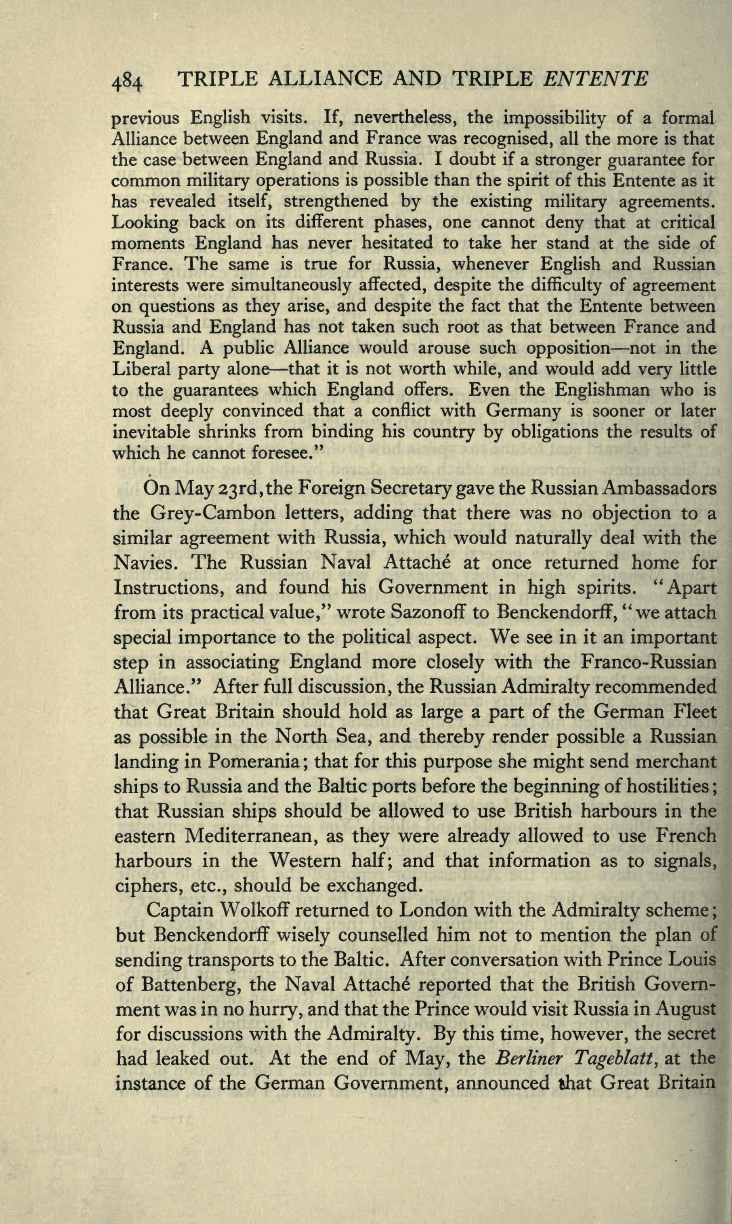
484
TRIPLE
ALLIANCE AND
TRIPLE
ENTENTE
previous
English
visits.
If, nevertheless,
the
impossibility
of a
formal
Alliance
between
England
and France was
recognised,
all
the
more is that
the
case
between
England
and Russia.
I
doubt
if
a
stronger
guarantee
for
common
military
operations
is
possible
than the
spirit
of
this
Entente
as it
has
revealed
itself,
strengthened by
the
existing
military
agreements.
Looking
back on its
different
phases,
one cannot
deny
that
at
critical
moments
England
has never hesitated to
take her stand
at the side of
France.
The same
is true
for
Russia,
whenever
English
and
Russian
interests
were
simultaneously
affected,
despite
the
difficulty
of
agreement
on
questions
as
they
arise,
and
despite
the fact that the
Entente between
Russia
and
England
has not taken such
root as that
between France
and
England.
A
public
Alliance would
arouse such
opposition
—
not in the
Liberal
party
alone
—
that it is not worth
while,
and would
add
very
little
to
the
guarantees
which
England
offers. Even the
Englishman
who
is
most
deeply
convinced
that
a
conflict with
Germany
is sooner
or later
inevitable
shrinks
from
binding
his
country
by
obligations
the
results
of
which he cannot
foresee."
On
May
23rd,
the
Foreign Secretary
gave
the Russian Ambassadors
the
Grey-Cambon
letters,
adding
that there
was no
objection
to a
similar
agreement
with
Russia,
which would
naturally
deal
with
the
Navies.
The Russian
Naval
Attache
at
once returned
home
for
Instructions,
and
found his
Government
in
high spirits. "Apart
from its
practical
value,"
wrote Sazonoff
to
Benckendorff,
"we
attach
special
importance
to
the
political aspect.
We see in
it
an
important
step
in
associating England
more
closely
with the Franco-Russian
Alliance."
After
full
discussion,
the Russian
Admiralty
recommended
that
Great
Britain
should
hold as
large
a
part
of
the
German
Fleet
as
possible
in
the North
Sea,
and
thereby
render
possible
a
Russian
landing
in Pomerania
;
that
for
this
purpose
she
might
send merchant
ships
to
Russia
and
the Baltic
ports
before the
beginning
of
hostilities
;
that
Russian
ships
should be allowed
to
use
British
harbours in the
eastern
Mediterranean,
as
they
were
already
allowed to use
French
harbours
in
the Western
half;
and
that information
as
to
signals,
ciphers,
etc.,
should
be
exchanged.
Captain
Wolkoff
returned
to
London
with the
Admiralty
scheme
;
but
Benckendorff
wisely
counselled
him
not to
mention
the
plan
of
sending
transports
to the Baltic.
After
conversation with
Prince
Louis
of
Battenberg,
the
Naval
Attache
reported
that the
British
Govern-
ment
was
in no
hurry,
and
that the
Prince would
visit
Russia
in
August
for discussions with the
Admiralty. By
this
time,
however,
the
secret
had leaked out.
At the end
of
May,
the Berliner
Tageblatt,
at
the
instance
of the German
Government,
announced that
Great
Britain
